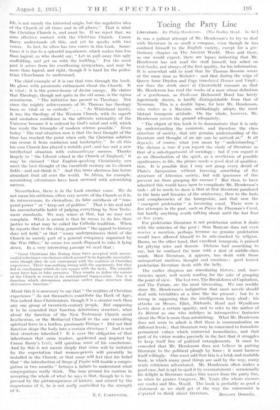Toeing the Party Line
Literature. By Philip Henderson. (The Bodley Head, 3s. -(3d.) IT was a gallant attempt of Mr. Henderson's to try to deal with literature in so small a compass, even though he has confined himself to the English variety, except for a pre- liminary chapter on The Ancient World. Here and there, as one would expect, there are lapses indicating that Mr. Henderson has not read the stuff himself, but relied on text-hooks, not always of the first quality, for his information. It is somewhat odd to read that Sir Thomas Browne wrote at the same time as Webster : and that during the reign. of Queen Anne Dryden and Pope translated Homer and Virgil ; nor does the stock sneer at Chesterfield reassure us that Mr. Henderson has read the works of a man whose definition of a gentleman, us Professor Richmond Bond has lately ingeniously shown, is hardly distinguishable from that of Newnian. This is a double lapse, for here Mr. Henderson, who writes as a Marxian, unblushingly adopts the most blatant bourgeois attitude. On the whole, however, Mr. Henderson covers the ground adequately.
" The object of this book is to demonstrate that it is only by understanding the economic, and therefore the class structure of society, that any genuine understanding of the literature and thought of an age can be arrived at." It all depends, of course, what you mean by " understanding." The dictum is true if you regard the study of literature as that of a sub-department of .sociology : but if you regard it
as an illumination the spirit, as a revelation of possible significances in life, the phrase needs a good deal of qualifica- tion. It is possible that I may not grasp every detail of Plato's Symposium without knowing something of the structure of Athenian society, but will ignorance of this prevent me from grasping the essence ? But then, to have admitted this would have been to complicate Mr. Henderson's task : all he needs to show is that at first literature pandered to the lusts and luxuries of the aristocracy, then to the lusts and complacencies of the bourgeoisie, and that now the " emergent proletariat " is becoming vocal, There were a few attempts in the past, such as Pierce the Plowman's Creed, but hardly anything worth talking about until the last four or five years.
For proletarian literature is not proletarian unless it deals with the miseries of the poor : thus Bunyan does not even receive a mention, perhaps because no genuine proletarian would have allowed himself to be side-tracked by religion. Burns, on the other hand, that excellent bourgeois, is praised for pitying mice and flowers. Dickens had something to say, but he confused the issue with a deal of middle-class mush. Most literature, it appears, has dealt with those unimportant matters, thought and emotions : good honest proletarian literature deals with the belly.
The earlier chapters are stimillating history, and, inac- curacies apart, well worth reading for the sake of grasping the point of view. The last two, The Breakdownef Capitalism, and The Future, are the most interesting. We can readily share Mr. Henderson's indignation that most novels should deal with trivialities at a time like the present ; but he is wrong in supposing that the intelligentsia keep aloof : his attacks on Messrs. EPA, Richards, Read and Wyndham Lewis. show„a certain opacity, and to refer to the author of In Retreat as : one who indulges in introspective fantasies about the War is more than astonishing. What Mr. Henderson does not seem to admit is that there is communication on different levels ; that literature may be concerned to formulate permanent values which transcend immediacies, and that part of its virtue resides precisely in thofact that it struggles tb keep itself free of political entanglements. It must be conceded that .Mr. Henderson does not believe in putting lit era I a re to the political plough by force : it must, harness itself willingly. One must add that this is a brisk and readable book, in which many good things are said by the way, many acute criticisms adventured. Mr. Henderson often makes a good vase, Un I is apt to, spoil it by overstatement : occasionally his delight, in literature makes him waver from the party line, as when he ,praises Congreve, Mr. Yeats (for whom excuses are made) and Mrs. Woolf. The.book is probably as good a statement as we shall get of the way the communist is
e'xpeeted to think about literature. BoNmav DonagE.






































 Previous page
Previous page